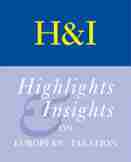
Highlights & Insights on European Taxation (H&I) bevat diepgaande informatie over actuele ontwikkelingen binnen het Europees belastingrecht zoals de omzetbelasting, douane, accijnzen en de winstbelasting. Een team van internationale experts becommentarieert jurisprudentie van het Europese Hof van Justitie, voorstellen van de Europese Commissie en andere Europese instanties.
In Highlights & Insights on European Taxation (H&I) zijn in januari onder andere de volgende bijdragen verschenen.
In Highlights & Insights on European Taxation (H&I) zijn in december onder andere de volgende bijdragen verschenen.
In Highlights & Insights on European Taxation (H&I) zijn in november onder andere de volgende bijdragen verschenen.
In Highlights & Insights on European Taxation (H&I) zijn in oktober onder andere de volgende bijdragen verschenen.
De inspecteur doet collectieve uitspraak op massaal bezwaar tegen het in rekening gebrachte percentage belastingrente voor de vennootschapsbelasting en enige overige middelen vanaf 1 oktober 2020. De uitspraak strekt tot gegrondverklaring van de bezwaren.
De inspecteur doet collectieve uitspraak op massaal bezwaar tegen het in rekening gebrachte percentage belastingrente voor de inkomstenbelasting en enige overige middelen vanaf 1 oktober 2020. De uitspraak strekt tot ongegrondverklaring van de bezwaren.
De Staatssecretaris van Financiën trekt het Besluit Heffing van omzetbelasting ten aanzien van verenigingen voor vreemdelingenverkeer (1 januari 2002, CPP2001/2155M, V-N 2001/60.1.16) in.

